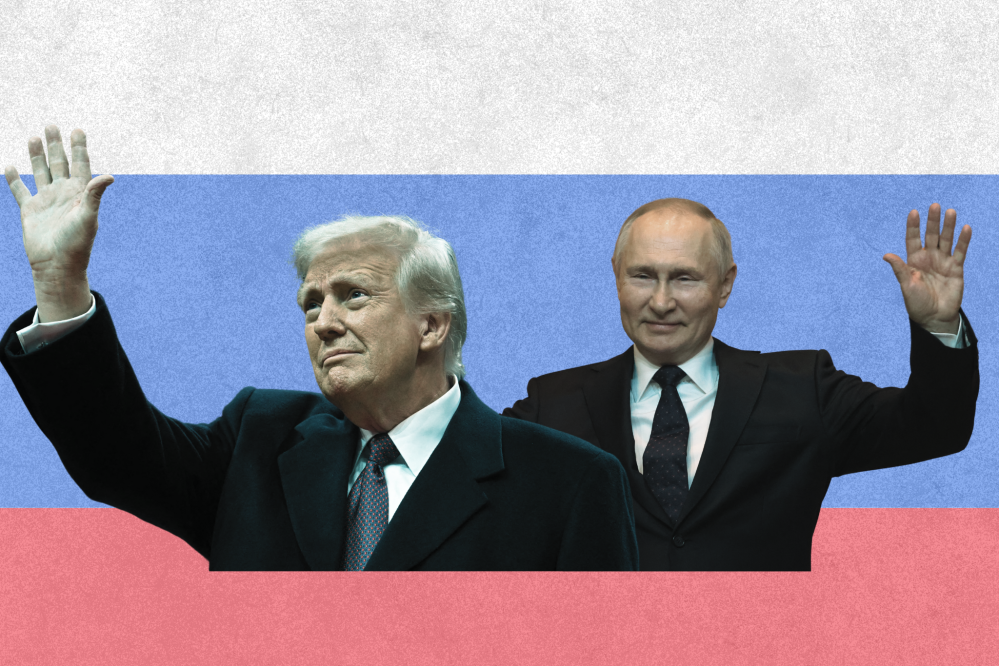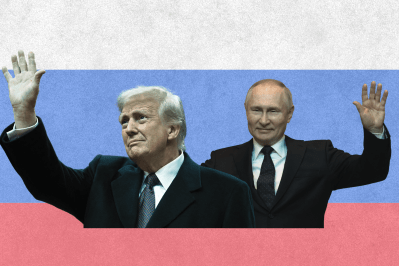Government under Donald Trump has its amusements. One fun feature left over from his first term is Republican politicians using their appearances on news shows to lobby him through the television set, knowing he’s a hopeless TV addict and will see it at some point. It’s true to the idiotic spirit of Trumpy politics: Even policy is a performance.
It happened again on Sunday when Rep. Dan Crenshaw spoke to Face the Nation about Ukraine. Crenshaw is a staunch hawk, often compared to the late John McCain by his populist detractors, and plainly was looking to persuade the president to stand strong with Volodymyr Zelensky and Kyiv. So he appealed to him in his native tongue, the language of strength and dominance.
“There is no way, there is absolutely no way, that Donald Trump will be seen—he will not let himself go down in history as having sold out to Putin,” Crenshaw declared. “He will not let that happen. … Just for the sake of his own legacy!”
Dan, I have bad news.
On Tuesday, reporters asked the president about leaving Ukraine out of this week’s talks in Saudi Arabia between the U.S. and Russia. “Today I heard, ‘Oh, well we weren’t invited.’ Well, you’ve been there for three years,” Trump answered, referring to Zelensky. “You should’ve ended it in three years. You should have never started it.”
Started it?
“You have leadership now that’s allowed a war to go on that should have never even happened,” he continued.
That wasn’t the first time he’s blamed Ukrainians for supposedly “allowing” Russia’s war of conquest. He did it in October too, a few weeks before the election. But fascist propaganda hits different, as the kids say, when it’s coming out of the mouth of the president of the United States while he’s supposedly trying to broker a just peace between two combatants.
He wasn’t done. “Mr. Trump uttered not one word of reproach for Mr. Putin or for Russia” during his comments on Tuesday, the New York Times noted. Rather the opposite. At one point, he saluted the good faith of the rape-and-pillagers in Moscow by praising their supposed desire “to stop the savage barbarianism.”
He even alleged that Zelensky’s approval rating at home had fallen to 4 percent, a lie so preposterous that it could have come from the Kremlin itself. It did come from the Kremlin, Zelensky told reporters on Wednesday: “Kyiv has some evidence that the [poll] numbers were discussed between the U.S. and Russia,” CNN reported. The Ukrainian president’s actual job approval is 57 percent, higher than Trump’s and up 5 points since December.
Trump “unfortunately lives in this disinformation space,” Zelensky went on to say, a pithy epitaph for the Pax Americana.
On Wednesday, Trump responded with a statement accusing Zelensky—not Putin—of being a “dictator” because Ukraine, currently under martial law, hasn’t held its presidential election as scheduled. (Since when do nationalists care about promoting democracy abroad, especially ones with a coup attempt under their belts?) He’s done a “terrible job,” the president alleged, implying that the Ukrainian government has been looting the aid our country has sent to it.
Do Americans realize what they’re witnessing here?
What happens if, or when, they do realize it?
The good guys.
Political media will spend the next four years debating what voters expected when they reelected Trump in 2024. What sort of “mandate” did they grant him?
They expected more affordable groceries and a tighter border, for sure. But what else? When you knowingly hand back power to a man under federal indictment for plotting a coup, you’re signing up for more than the usual amount of envelope-pushing from the new administration. How much more, exactly?
Did Americans expect clemency to be granted to every last January 6 insurrectionist? Did they expect the out-and-out corruption of federal law enforcement? Did they expect Elon Musk and his minions to hack into databases and start reprogramming the U.S. government? Do they expect the president to ignore court orders because that’s what Napoleon would have done?
More to the point: Did they expect America to become one of the bad guys of the international order? Because that’s what Trump is doing now, right in front of them, first with his is-he-kidding designs on Greenland and Canada and now much more seriously by taking up Russia’s cause against Ukraine.
The rap on Americans is that they don’t care about foreign policy unless and until U.S. boots are on the ground. They care about domestic policy because it bears on them directly and because the partisan media they consume obsesses about it, particularly its cultural flashpoints. But foreign policy? The conflicts, combatants, and issues at stake are too distant and esoteric to keep track of. Who cares?
What I think Americans do care about, though, is their belief that the United States isn’t just a force for good in the world, it’s the force for good.
How could they not? It’s a bedrock conviction of every child of the Cold War (except the one in the White House, oddly). The United States was a bulwark of freedom against Nazism, then against communism, then against jihadism. Totalitarian scumbags of every stripe eventually find themselves at odds with Uncle Sam because we oppose their programs of subjugation. Americans are proud of that, and should be.
We’re the good guys. Which is a problem for Donald Trump’s plans for Ukraine.
Ukraine’s war is the exception to the rule about foreign policy in that it’s not esoteric at all. Nothing could be simpler than the moral equities involved in a fascist power invading a smaller neighbor and attempting to pulverize it into submission. The fascist power in this case is an American enemy of long standing; its leader exudes the sort of cartoonish malevolence typically seen in movie villains; and the war it’s waging is against the entire population, up to and including kidnapping the other side’s children.
That other side has fought gallantly, against long odds. Its highest ambition is simply to join the United States in an alliance in hopes of keeping its neighbor’s boot off its neck.
I think it will be very hard under those circumstances, even for a salesman as practiced as Trump, to convince Americans that their sense of good and bad in Ukraine is scrambled. It’s one thing to argue that the U.S. can no longer afford to support Kyiv. It’s another to argue, as the president has now begun to do, that Ukrainians are responsible for the war and are the chief obstacle to peace.
Trump and his allies have been remarkably successful at muddying the moral waters around domestic matters like presidential elections, separation of powers, and, soon, the authority of judicial rulings. On any given night you can turn on Fox News and find some rich degenerate arguing semi-intelligibly that we don’t live in a democracy unless the president gets to do whatever he wants. Too many modern Americans lack the civic foundation and basic constitutional knowledge to see through postliberal political sophistry. If Trump attains dictatorial power, he’ll do so having convinced half the population that the Founders would have wanted it that way in the name of “saving the country.”
But the MAGA movement hasn’t done as well at persuading Americans that the bad guys abroad aren’t actually bad. The degree of difficulty is too high: No amount of sophistry can obscure the wickedness Russia has practiced in Ukraine, even to otherwise docile Republicans in Congress and Trump toadies in right-wing media. Despite the best efforts of authoritarian “ass-lickers” like Tucker Carlson, a poll taken last year found Putin’s favorable rating in the United States down to 8 percent, lower than it was in 2022 when the war began.
Ukraine versus Russia is basic, basic good-versus-evil stuff. The president is asking Americans to take sides with evil—to help make the world safe for autocracy, to borrow a phrase.
How will voters weaned on the idea that their country is a force for good react to seeing their leader renounce that idea and buddy up to ruthless villainy?
The perils of appeasement.
Not well, I think. At the risk of sounding optimistic (ugh), there’s genuine peril for Trump in how he handles Ukraine.
Afghanistan is a useful analogy. For all the hype about inflation and immigration in the last election cycle, it was the fall of Kabul in 2021 that knocked Joe Biden’s job approval off a cliff. By the autumn of that year, the then-president had a 41.3 percent rating; on Election Day 2024, it was 41.1 percent. The lightning advance of the Taliban and shambolic retreat of American troops shattered the public’s faith that “the adults” were back in charge in Washington after four years of Trumpy amateurism. Foreign policy did, for once, hurt the governing party badly.
The U.S. military isn’t in harm’s way in Ukraine as it was in Afghanistan, but the stakes of failure in Kyiv are also stratospherically high, and not just because we spent a ton of money on both countries to try to bolster relatively liberal governments against enemies of civilization. Withdrawal from Afghanistan did not collapse the Western liberal order; abandoning Ukraine very well could.
In fact, as I write this, rumors are circulating that Trump is preparing not only to meet Putin’s demands in Ukraine but to withdraw America’s forces from eastern Europe. If he does that, NATO is finished. The White House would be all but declaring that the United States won’t intervene if Russia attacks members of the alliance in its near-abroad.
Many things would flow from that.
One, as I’ve said, is that Americans would be forced to reckon with the fact that their new government is neutral at best and enthusiastic at worst about fascist Russia launching military attacks on longstanding U.S. allies. Trump voters are quite skilled by now at rationalizing their candidate’s obvious malevolence, but watching him stand back and green-light a Putin takeover of eastern Europe would be an interesting test of their loyalty. Many would pass it, to be sure, but some would not. Just as the Afghanistan debacle fundamentally altered Americans’ views of Biden, a Ukraine debacle would shake them from their stupor about who and what Trump is.
Certainly, it would alter some voters’ view of him as a skilled negotiator. Trump did have some diplomatic successes in his first term, the Abraham Accords most notably, but his reputation as a master of the art of the deal derives mainly from, er, The Art of the Deal. My editor reminded me today that the Munich-style sellout of Ukraine on which Trump’s now embarked isn’t even the first time he’s cut an ally out of peace talks about a conflict raging on that ally’s territory. He did the same thing in 2019 when he tried to swing a deal with the Taliban without letting the Afghan government know.
If he ends up appeasing Putin by rubber-stamping Russia’s list of demands, the mortification that Dan Crenshaw evinced at the thought will spread from the left all the way to the Reaganite remnants of the right. Americans will be forced to choose between believing that their president is a fascist sympathizer who earnestly wants the bad guys to prevail and believing that their president is a naive soft-headed chump who got rolled by a smarter, more ruthless authoritarian and is now being laughed at on Russian television.
Either way, not great for his and his party’s image.
Owning the disaster.
The biggest risk to the president in selling out Ukraine, though, is that the political consequences will fall entirely on him.
Democrats will tell you, with some justification, that Biden’s disastrous Afghanistan retreat was a bipartisan project. It was Trump who negotiated the deadline for withdrawing U.S. troops that the new administration faced in 2021; had Biden ignored it, the ceasefire with the Taliban would have ended and American soldiers would have been at risk. In the end, Biden followed through and never recovered from the political fallout of Afghanistan’s collapse. Trump’s culpability in forcing a “stay or go” decision on his successor has been all but forgotten.
He won’t be able to dodge blame for what happens with Ukraine. If Kyiv collapses after he withdraws American support and the country is overrun by Russia, that’s on him.
If a continental-wide war breaks out for the first time since 1945 because NATO without American military might is no longer a meaningful deterrent, at least temporarily, that’s on him.
If China takes all of that in and opts to attack Taiwan, correctly deducing that Trump is no more likely to defend U.S. allies in the Far East than he is in the West, that’s on him.
If, further, China swoops in to fill the security vacuum in Europe created by America’s departure, gaining important Western allies for its own expansionist project, that’s on him. “Ukraine has a lot to offer to China in return for security—rebuilding, ports, agricultural produce,” one Lithuanian analyst observed last week. “There will be those in Europe who will support this. This gambit could be called a ‘Kissinger’, splitting the U.S. and Europe as Kissinger split the Soviet Union and China.”
If the United States ends up in a conflict with China and the anti-American alliance that we’re creating leads formerly friendly European nations to remain neutral, or worse, that’s on him.
And if a dozen or more nations suddenly start building nuclear weapons, sharply raising the risk of nuclear conflict because the world’s policeman is no longer interested in walking the beat, that’s on him too.
All in all, “the pro-peace administration” is apt to encourage a lot of war by aligning America with the world’s bad guys. One would hope Trump and his party will take the political blame for the disasters that ensue, although the pessimist in me can’t rule out that meaningful chunks of American voters, zombified by partisan propaganda and desperate not to reckon with the global misery that they’ve unleashed, might talk themselves into believing that formal neutrality absolves them of moral responsibility for letting their country be turned into a force multiplier for the villains of the Earth.
To get them to do it, though, populists will need to tear down a metric ton of intellectual infrastructure that’s been built over the past 80 years around the idea that the world is freer, safer, and comprehensively better for American leadership. It’s not impossible—witness the job they’ve done on the pitiful sucker who’s pretending to be secretary of state, once one of the GOP’s best evangelists for projecting power and now reduced to spectacles like this—but it’ll be a heavier lift than they’re used to. Here’s hoping they fail spectacularly.







Please note that we at The Dispatch hold ourselves, our work, and our commenters to a higher standard than other places on the internet. We welcome comments that foster genuine debate or discussion—including comments critical of us or our work—but responses that include ad hominem attacks on fellow Dispatch members or are intended to stoke fear and anger may be moderated.
With your membership, you only have the ability to comment on The Morning Dispatch articles. Consider upgrading to join the conversation everywhere.